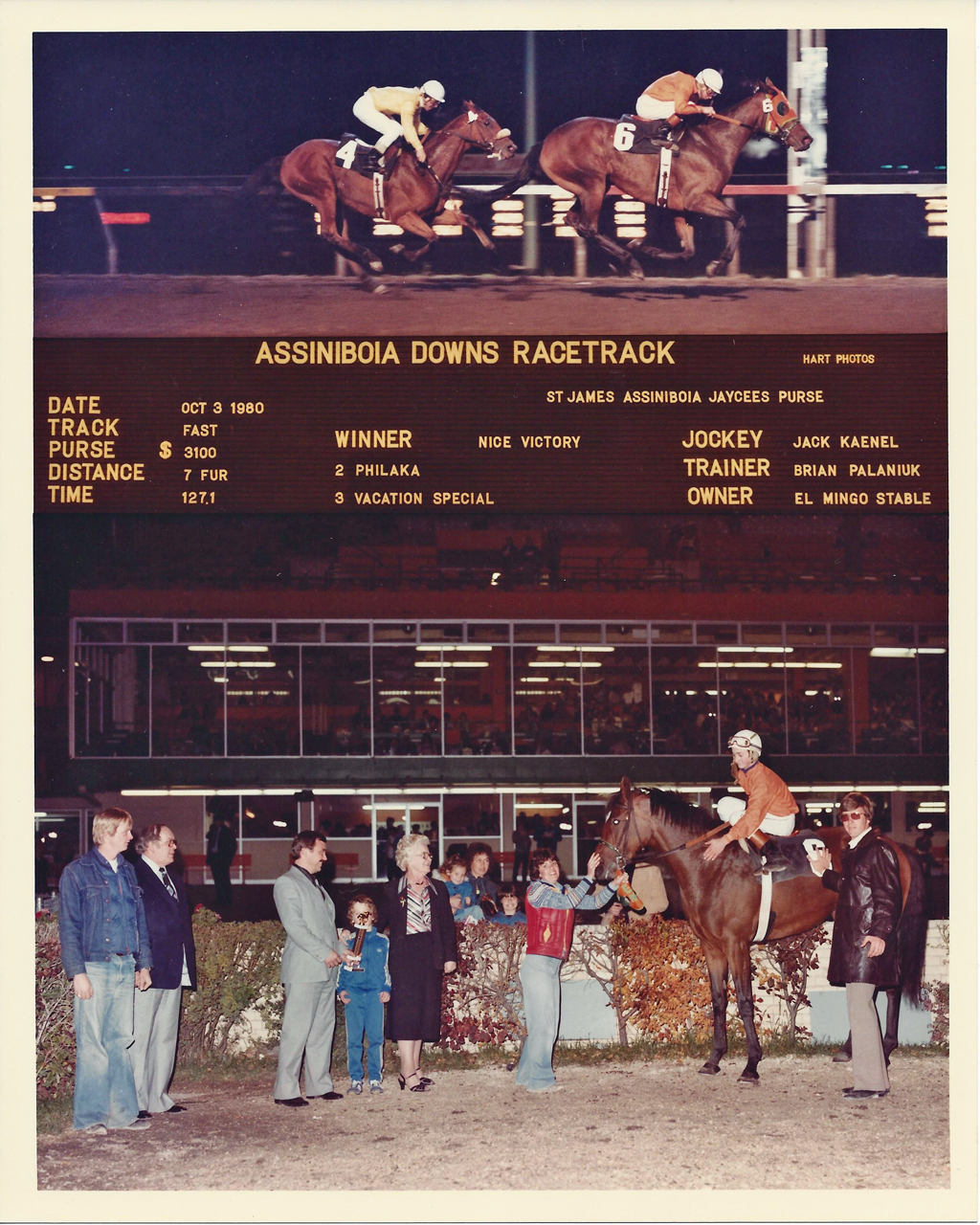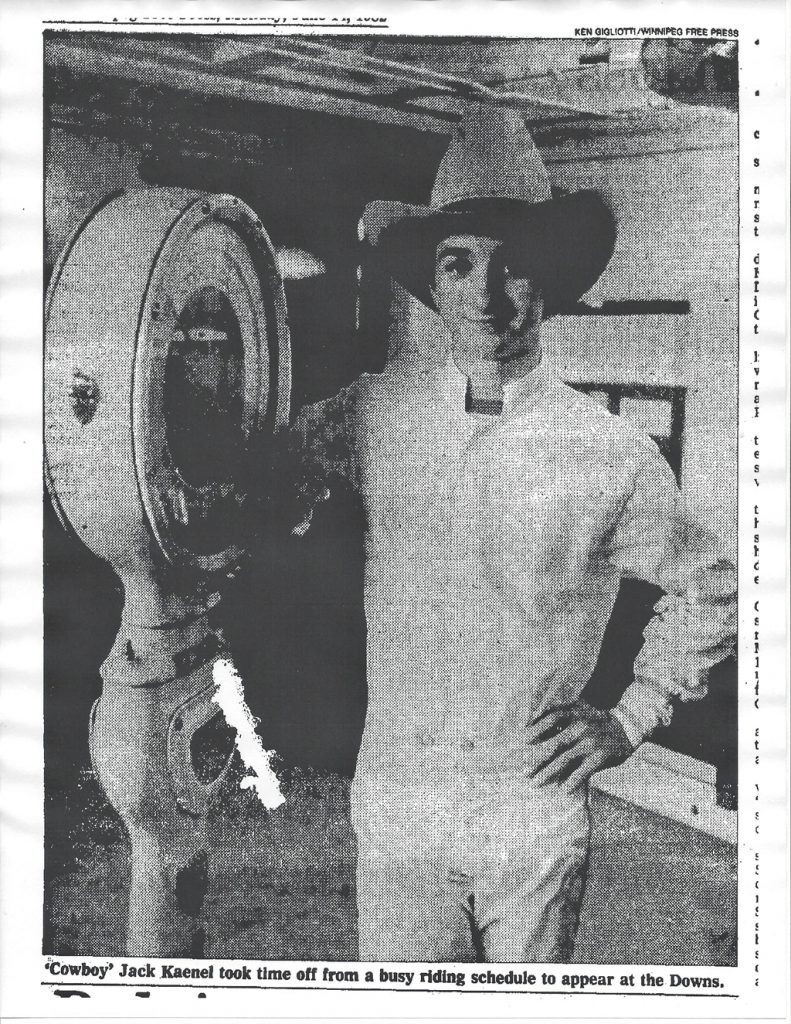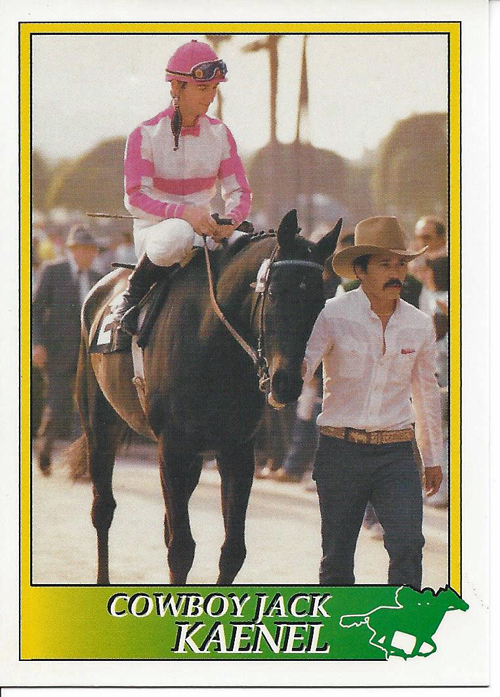
by Bob Gates
With this year's Preakness in the books, Justify and jockey Mike Smith are busy preparing their bid for racing's Triple Crown. For reasons unknown to me the recent Preakness stirred-up a 36 year-old memory of the second leg of the Triple Crown.
In 1982 a young Jack Kaenel and his mount Aloma's Ruler "cowboyed" the legendary Bill Shoemaker, who was aboard the odds-on-favourite Linkage at Pimlico racecourse to win the Baltimore classic.
How many of you remember Jack Leroy Kaenel? Chances are if you do, you also know that the kid got his start right here in the summer of 1980. Yes sir, the youngest jockey in modern times to win a Triple Crown race galloped horses, got his jockey's licence and broke his maiden at Assiniboia Downs!
You can check all the records books, but I'll wager that no other jockey from our modest little track ever won a Triple Crown race or got his first win on a recognized track at the Downs. That should make us all proud!
 Before we go any further, let's take a look at Jack's early years. The story goes that at four years of age, he walked horses and cleaned stalls for his father. By seven he was working in the jock's room in Lincoln, Nebraska. At 11 he was riding at bush tracks in Kansas, Oklahoma, Nebraska and Colorado.
Before we go any further, let's take a look at Jack's early years. The story goes that at four years of age, he walked horses and cleaned stalls for his father. By seven he was working in the jock's room in Lincoln, Nebraska. At 11 he was riding at bush tracks in Kansas, Oklahoma, Nebraska and Colorado.
In his first race, his assigned weight was 120 pounds, but he had trouble making the weight. Not because he was too heavy, Kaenel weighed in at 70 pounds back then. In order to make the weight, racing officials crammed 50 pounds of lead into his tack. His mount that day, "Play with Jack" ran second.
His first "big" win? He was 13 when he won the Watermelon Derby in Rocky Ford Colorado in 1978. He earned $300 and a giant watermelon -- a tidy prize for his age.
For our purposes, Kaenel's story started in the summer of 1980. Blink once and you probably missed the "Cowboy's" Assiniboia Downs experience. Jack didn't spend a whole bunch of time here, but he did get his feet wet at our track. He started slow, galloping horses in the morning, but it wasn't long before racetrackers encouraged the young man to apply for his licence.
The wanna be jock produced a Kansas birth certificate indicating that he was born on July 27, 1964. The Downs issued Kaenel his licence on September 12, 1980 and he was in the irons later that day. His first appearance came in race five aboard Drag Fly. There would be no miracles in his first trip around our oval. He finished sixth in a field of eight, a modest start to say the least. The apprentice broke his maiden the following night, September 13, on Royal Sidney, returning a handsome $20.80 for a $2 wager. It was obvious to all that the kid had something special going for him. He had talent and a bright future in the irons awaited him.

Bobby Watson was one of the Downs racing stewards at the time and he had nothing but praise for the young saddlesmith. Watson knew what he was talking about. He had spent 23 years riding at major tracks in the U.S. and Canada against such greats as Eddie Arcaro and even rode in the 1945 Kentucky Derby. Watson compared Kaenel to fellow-countrymen Sandy Hawley and Jeff Fell.
On October 22, 1980 Kaenel had a stellar night at Winnipeg's westend oval. On his way to racking up 20 wins at the Downs, Kaenel rode four winners and had a second place finish, not a bad night for any rider let alone a just turned 16-year-old. His 20 wins in 1980 weren't coming from even-money favourites either. That Wednesday night his mounts paid $23.40, $14.90, $58.70 and $7.00.
Kaenel was riding at Baltimore's Pimlico racetrack in 1981 and was making all sorts of headlines, but not all were the kind he wanted. He was Pimlico's leading rider during the spring meet. It wasn't long however, before things started to unravel.
The licence issued by Assiniboia Downs in 1980 had been accepted in seven states where he had won more than 100 races before the "law" caught up to him. Actually, it wasn't the law so much as it was the Washington Star newspaper.
In May 1981 a Washington Star reporter was gathering background on Kaenel and discovered that an Omaha Nebraska hospital listed Jack's date of birth as July 27, 1965, not 1964 as was on his Kansas birth certificate. This made young Kaenel, 15, nearly three months short of the legal age to ride in most jurisdictions including Maryland, New York, New Jersey and Manitoba. Oops!
The Pimlico stewards chose not to suspend Kaenel, but he was forbidden to ride until he turned 16 on July 27, 1981. Maryland racing officials didn't feel that drastic punitive action was necessary. They voted to void the 15-year-old's licence. In effect the Boards' actions wiped his record clean with no official reference of a "suspension." The Board was satisfied that there was nothing evil about what Jack had done. From his 16th birthday until his 1982 Preakness victory, Jack rode his butt off, making a name for himself in the racing biz.
By 1982, Kaenel was well-known for wearing your typical western headgear. His signature Stetson went well with the label "Cowboy Jack" or just plain old "Cowboy." At the time he was being touted as the successor to Steve Cauthen as racing's new "Whiz Kid."
There was nothing romantic or fairytale-like about the events that led to him getting the Preakness mount on Aloma's Ruler. He got the call after Angel Cordero, Jeffrey Fell and Chris McCarron turned it down. It’s also a bit ironic that Cowboy Jack and this year's winning Preakness jockey, Mike Smith, were both born in 1965, a little more than a month a part.
 Jack was never bitter about the Washington Star blowing his cover, but there was a certain measure of, let's call it karma. In a strange twist of fate, just as Jack was celebrating his 16th birthday and getting ready for his return to the saddle, the Washington Star was going out of business.
Jack was never bitter about the Washington Star blowing his cover, but there was a certain measure of, let's call it karma. In a strange twist of fate, just as Jack was celebrating his 16th birthday and getting ready for his return to the saddle, the Washington Star was going out of business.
Following his historic Preakness win, Jack returned to his old stomping grounds at Assiniboia Downs on Sunday June 13, 1982. Why? Because family friend and Downs' track announcer, Richard Grunder, asked him to, and that's what friends do for each other!
Now legal and actually 16, Kaenel kept the promise to his friend in spite of an offer to ride in a $100,000 stake in Delaware. On that Sunday afternoon the Assiniboia Downs graduate had six mounts on the ten-race card and rode for what you might call the "cycle." He had a first, a second, a third, a fourth, a fifth and you guessed it, a sixth place finish.
Most of the people I spoke with about Kaenel had only spotty memories of his short time here in 1980. Doc Meek explained that young Jack was just trying to blend in back then. He knew he was underage and wasn't looking to make trouble. He just wanted to do what he loved. To ride. And he did it very well.
Jocks' Room Supervisor Dwayne Addison was a valet at the time and recalled That Kaenel was a real light-weight kid with natural ability. And he wasn't short on confidence. Downs' jockey great, Irwin Driedger was quoted as saying that horses ran for the Cowboy and he just looked good on a horse.
The mind is a wonderful thing. We know not how or why we remember what we do. We just do. Cowboy Jack helped put us on the national stage in 1982 and no one can take away from the fact that the Preakness winning jockey got his first win on a recognized track…
At Assiniboia Downs.


